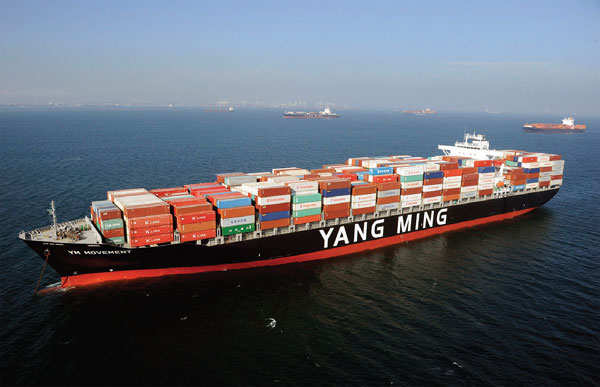Port standoff creates logjam in cargo traffic
Updated: 2015-02-13 11:46
By Lia Zhu in San Francisco(China Daily USA)
|
||||||||
|
Ships gather off the ports of Los Angeles and Long Beach, California, in this aerial photo from Feb 6. Twenty-nine West Coast ports are impacted by a months-long labor dispute between the International Longshore and Warehouse Union (ILWU), which represent 20,000 dockworkers in California, Oregon and Washington, and Pacific Maritime Association (PMA) which negotiates for the major port employers. Reuters |
A harbor trucker waited in a long line at the Port of Oakland on Thursday morning before finally picking up a container from China. "Yesterday I waited for six hours and got nothing," he said of the furniture shipment from to a client in San Jose.
The trucker, who gave only his last name, Cui, said he felt helpless over the loss of business caused by the recent labor slowdown at the Northern California port.
"Ten to 15 vessels a day await berths outside the port, and some of them originate in China," Port of Oakland spokesman Mike Zampa told China Daily on Thursday. "The cargos include machine parts for factory assembly lines, auto parts, consumer electronics, household goods, apparel and toys," he said.
The Port of Oakland is one of 29 West Coast ports impacted by a nine-month-long labor dispute between the International Longshore and Warehouse Union (ILWU), which represents 20,000 dockworkers in California, Oregon and Washington, and the Pacific Maritime Association (PMA), whose principal business is to negotiate and administer labor agreements with the ILWU.
The disruption caused by the slowdown escalated on Wednesday as the PMA announced a four-day shutdown (Thursday, Saturday, Sunday and Monday) to avoid paying dockworkers weekend and holiday premiums for "severely diminished productivity while the backlog of cargo at West Coast ports grows".
The ILWU attributed the congestion of vessels to the ports' employers, who "have idled vessels twice in less than a week" and who have canceled negotiation sessions with them. ILWU President Robert McEllrath accused PMA of "putting economic pressure on our members" to "gain leverage in contract talks".
More than 30 ships sat idle off the West Coast on Thursday. The unloading of ships, mostly from Asia, and the loading of containers to carry US exports are suspended at the seaports, which handle nearly half of all US maritime trade and more than 70 percent of Asian imports. The cargo handled at those ports is worth around $1 trillion annually.
Cui and his San Francisco-based freight transportation company have suffered in the standoff.
"The business has been reduced by two-thirds since the slowdown in June last year," said the company's dispatcher, who requested anonymity for fear of antagonizing the dockworkers' union. "Most of the containers are from Chinese mainland and Hong Kong," she said.
The impact is felt almost worldwide in an era of globalization, especially by Asia and the Americas.
"China-US trade will absolutely suffer from the dispute impasse and cargo buildup," said Mark Wen, president of the Washington State China Chamber of Commerce. "The West Coast is a critical gateway for both imports and exports between the two countries."
China is Washington state's largest trading partner, and imports from China account for 78 percent of the total cargo volume that the Port of Seattle handles every year.
"Manufactured goods, furniture, electronics and toys from China are coming through the port to the central parts of America," said Wen. "Among the exports to China, about 50 percent are from the agricultural sector, including Washington apples and French fries."
Perishable and seasonal items are most impacted by the delays because they need to be loaded onto ships quickly for delivery to meet a narrow window of retail opportunity.
"In Washington, 30 percent of the agricultural output is for export, so the local farmers will suffer a loss of income," Wen said.
"At the same time, since the supply chain is disrupted, you can imagine how much the Chinese factories will lose," he said.
Like multinational companies that are reporting lost revenue and increased costs, small business owners are losing money, too, for failing to get goods on the shelf in time. Some are paying high premiums for work-arounds such as air freight.
The National Retail Federation warns that a shutdown over a 10-day period could be a daily $2.1 billion hit to the economy, as half of the nation's imports pass through the 29 ports.
There have been no legislative or regulatory developments that could lead to a settlement.
According to the Port of Oakland, even if a contract agreement were reached, the maritime officials estimated it could take two months to clear the cargo backlog on the West Coast.
"Since this is caused by a labor dispute within America, Chinese businesses have nothing to do but wait for a settlement," Wen said.
liazhu@chinadailyusa.com

 Lhasa sees heaviest snow in two decades
Lhasa sees heaviest snow in two decades
 Samba sparkles in Brazil's Carnival season
Samba sparkles in Brazil's Carnival season
 'Taxi' wins Golden Bear in 65th Berlinale
'Taxi' wins Golden Bear in 65th Berlinale
 Let's take a selfie
Let's take a selfie
 Eight-year-old turns camera on premier
Eight-year-old turns camera on premier
 Pole dance under rime trees
Pole dance under rime trees
 Couples go to extreme height for love
Couples go to extreme height for love
 When Spring Festival rush encounters Valentine's Day
When Spring Festival rush encounters Valentine's Day
Most Viewed
Editor's Picks

|

|

|

|

|

|
Today's Top News
Apple studies self-driving car: auto industry source
Second-longest railway built overseas by China rolls out
Graft buster publishes corruption cases in environmental sector
2 deadly shootings within hours in Copenhagen
Xi's New Year visit marks village homecoming
Jackie Chan's son apologizes after release from jail
US smartphone launch still some time off for Xiaomi
Beijing strengthens festival safety
US Weekly

|

|








